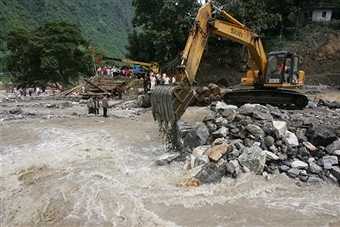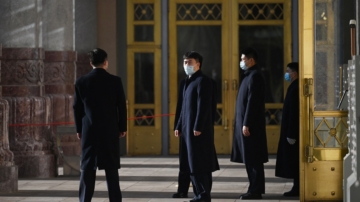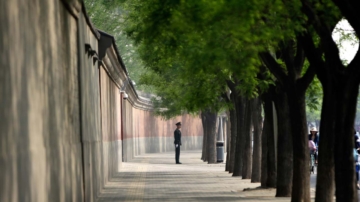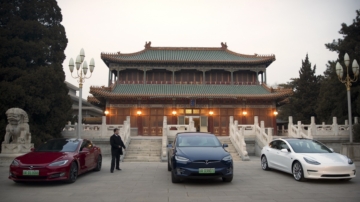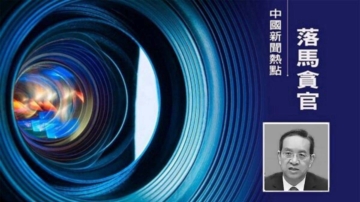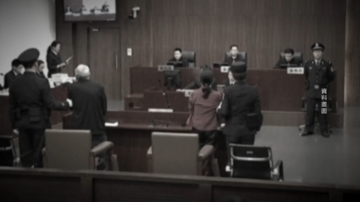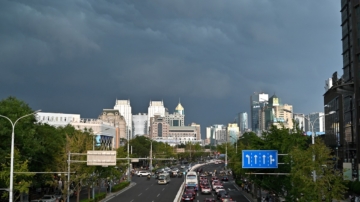【新唐人2012年11月27日讯】中共当局在2-30年间发展经济的过程中,大陆的环境和资源,特别是水资源遭到极大的破坏,长期以来也不断受到中外专家诟病。“十八大”之后,有舆论认为,习进平和李克强上任后,要做的事之一是解决中国的饮水问题。不过,有评论认为,已难以起死回生。下面就和专家一起来了解中国这道难解的问题。
上周五,美国“有线电视新闻网(CNN)”专栏“吉米的中国(Jaime's China)”发表“习近平要做的事之一:解决中国的饮水问题”,再度挑起中国水资源问题的议论。作者Jaime A. FlorCruz与一群专家们讨论了这个话题,大家都认为,中国的水危机看起来很严峻。中国水资源遭到极度浪费与生态的破坏问题,确实是极待即将上任的中国领导人解决的问题之一。
中国政治和社会观察家戴晴则指出,过去30年间,中国的官员虽然嘴上也说,要爱护环境等等。但因为环境和资源的保护,永远需要花钱而不会挣钱,更不会使GDP增长,在官员的任内不会有政绩。戴晴说,实际上,并没有人把环保真正当回事。而由于环境和资源所属不明确,先下手、权力大者可以无偿的去使用。
中国政治和社会观察家戴晴:“只要中国的这个政治体制、经济体制和民众不能够有效的监督当局,这个体制不变。那么,受害的放在第一位的,永远还是资源、还是环境。所以,那时候很多人对中国的政治改革、中国的未来,寄有很大的希望,我是非常悲观的,就算十八大或者十九大上台,但是,中国的环境和资源已经很难支持了。”
CNN的报导再次指出,中国快速的经济增长是以环境作为代价。虽然,中共官员确实探讨水资源问题。如,4月北京举办“中国水资源管理制度建设高级圆桌会议”。
但四川高级工程师,地质水利专家范晓分析,中国农业灌溉是以大水漫灌为主要方式,每亩地消耗水量很高;而大部分农业生产的主要地区,降雨量都是属于湿润和比较湿润的地区,并不缺水。
地质水利专家范晓:“但是,我们对水资源的利用还是一种粗放的模式,按着这个粗放的模式去扩大灌溉面积,当然它会导致水资源的不够用。现在中国工业、农业、居民生活用水的消耗指标都是很高的,高于世界的平均水准的。所以现在导致很多水资源短缺的现象,还是有人为原因造成的。”
另外,最近10几年之间,中国城市急剧的扩张。范晓指出,包括大量的工业开发区,大量高耗水、高耗能的工业项目上马。这个过程,已超出经济本身正常发展。
范晓:“或者叫环境容量和水资源容量所允许的可能,一种不切实际的所谓的发展,是以环境为代价的。可能少数人会获益,但是,对整个社会大多数人,它是不会带来好的利益的。”
据报导,中共国家发展改革委副主任杜鹰也曾在文章中说,中国水资源短缺,用水效率不高,仍以传统的“以需定供”方式谋求供需平衡,既不现实,也不符合经济规律和科学发展观的要求。
范晓指出,中国水资源的根本问题在于中共官员的思路和理念。他说,自1949年以来,中国在水利工程投入的财力和资金规模前所未有,但单纯以工程手段任意调节支配水源,而不是利用有限的水资源、适应自然、发展有序的科学模式,在利益驱使之下,水资源当然无法满足中共官员盲目无序的发展需求。
CCP’s New Leaders And China’s Damaged Water Resources
During the last 30 years of Chinese Communist Party (CCP)
authorities’ economic development,
China’s environment and resources, especially water
resources have been greatly damaged.
China has been criticized constantly for this.
After the CCP 18th Congress, it is estimated that one of the
key issues CCP’s new leaders Xi Jinping and Li Keqiang need to resolve is the quality of the drinking water.
However, there commentators think
this is a problem difficult to solve.
Last Friday, CNN’s column Jaime’s China published,
“One of the Things Xi Jinping Needs to Do Is to Solve
China’s Drinking Water Problem.”
It once again raised the issue of China’s drinking water.
Jaime A. FlorCruz and a group of experts discussed this topic.
They all believe China's water crisis looks grim.
One of the problems the new leaders need to resolve is the
extreme waste of water resources and ecological destruction.
China’s political and social observer Dai Qing pointed out,
officials only talk about caring for the environment.
Environment protection only cost money, not make money,
nor increase GDP, thus officials don’t benefit from protecting the environment.
Dai Qing said in fact nobody takes environmental protection
truly seriously.
Due to the unclear definition of environment and resources,
whoever gets hold of power can use the resources for free.
Dai Qing: “As long as people cannot effectively supervise
China's political system and economic system, the first victim is always resources and the environment.
I was very pessimistic when a lot of people had hopes
on China's political reform and China's future.
Though China might change after the 18th or 19th Congress,
it is very hard to keep China's environment and resources.”
CNN’s report pointed that China's rapid economic growth
is based on consumption of the environment.
CCP officials investigated water resource issues, such as
China's Water Resources Management System Construction
High-Level Roundtable held in Beijing in April.
Sichuan senior engineer, geology and water conservancy
expert Fan Xiao analyses that China’s agricultural irrigation is mainly flood irrigation, so water consumption is high.
However, most of the major agricultural production areas
have an adequate rainfall.
Fan Xiao: “Our mode of water consumption is extensive.
To expand the irrigation areas using this mode
will of course lead to insufficient water resource.
Now China' industrial, agricultural, living water consumption
indicators are very high, higher than the world average.
So there are human factors
causing shortage of water.”
In addition urban areas
expanded rapidly in the last 10 years.
Fan Xiao believes that launching many development zones,
high water consumption and high energy-consuming projects are already beyond normal economic development.
Fan Xiao: “There is an environmental capacity,
and a water capacity.
Unrealistic development is at the expense
of the environment.
It may be beneficial to a small number of people,
but not good to the majority of the people.”
Deputy director of CCP National Development and Reform
Commission, Du Ying, also mentioned this issue in his article.
While China suffers from water shortage,
China’s water usage efficiency is not high.
China still follows the model of "supply based on demand,”
which is neither realistic nor conforms to the economics laws or scientific concepts.
Fan Xiao pointed out that the fundamental issue of China's
water resources is CCP officials’ ideas and concepts.
He said that since 1949, China had made unprecedented
amounts of investment in water conservancy projects.
But those projects were simply moving water resources
using engineering means,
rather than using limited water resources, adapting to nature,
and developing an orderly scientific model.
Driven by interests, water can’t meet the blind development
needs of the CCP officials.
上周五,美国“有线电视新闻网(CNN)”专栏“吉米的中国(Jaime's China)”发表“习近平要做的事之一:解决中国的饮水问题”,再度挑起中国水资源问题的议论。作者Jaime A. FlorCruz与一群专家们讨论了这个话题,大家都认为,中国的水危机看起来很严峻。中国水资源遭到极度浪费与生态的破坏问题,确实是极待即将上任的中国领导人解决的问题之一。
中国政治和社会观察家戴晴则指出,过去30年间,中国的官员虽然嘴上也说,要爱护环境等等。但因为环境和资源的保护,永远需要花钱而不会挣钱,更不会使GDP增长,在官员的任内不会有政绩。戴晴说,实际上,并没有人把环保真正当回事。而由于环境和资源所属不明确,先下手、权力大者可以无偿的去使用。
中国政治和社会观察家戴晴:“只要中国的这个政治体制、经济体制和民众不能够有效的监督当局,这个体制不变。那么,受害的放在第一位的,永远还是资源、还是环境。所以,那时候很多人对中国的政治改革、中国的未来,寄有很大的希望,我是非常悲观的,就算十八大或者十九大上台,但是,中国的环境和资源已经很难支持了。”
CNN的报导再次指出,中国快速的经济增长是以环境作为代价。虽然,中共官员确实探讨水资源问题。如,4月北京举办“中国水资源管理制度建设高级圆桌会议”。
但四川高级工程师,地质水利专家范晓分析,中国农业灌溉是以大水漫灌为主要方式,每亩地消耗水量很高;而大部分农业生产的主要地区,降雨量都是属于湿润和比较湿润的地区,并不缺水。
地质水利专家范晓:“但是,我们对水资源的利用还是一种粗放的模式,按着这个粗放的模式去扩大灌溉面积,当然它会导致水资源的不够用。现在中国工业、农业、居民生活用水的消耗指标都是很高的,高于世界的平均水准的。所以现在导致很多水资源短缺的现象,还是有人为原因造成的。”
另外,最近10几年之间,中国城市急剧的扩张。范晓指出,包括大量的工业开发区,大量高耗水、高耗能的工业项目上马。这个过程,已超出经济本身正常发展。
范晓:“或者叫环境容量和水资源容量所允许的可能,一种不切实际的所谓的发展,是以环境为代价的。可能少数人会获益,但是,对整个社会大多数人,它是不会带来好的利益的。”
据报导,中共国家发展改革委副主任杜鹰也曾在文章中说,中国水资源短缺,用水效率不高,仍以传统的“以需定供”方式谋求供需平衡,既不现实,也不符合经济规律和科学发展观的要求。
范晓指出,中国水资源的根本问题在于中共官员的思路和理念。他说,自1949年以来,中国在水利工程投入的财力和资金规模前所未有,但单纯以工程手段任意调节支配水源,而不是利用有限的水资源、适应自然、发展有序的科学模式,在利益驱使之下,水资源当然无法满足中共官员盲目无序的发展需求。
CCP’s New Leaders And China’s Damaged Water Resources
During the last 30 years of Chinese Communist Party (CCP)
authorities’ economic development,
China’s environment and resources, especially water
resources have been greatly damaged.
China has been criticized constantly for this.
After the CCP 18th Congress, it is estimated that one of the
key issues CCP’s new leaders Xi Jinping and Li Keqiang need to resolve is the quality of the drinking water.
However, there commentators think
this is a problem difficult to solve.
Last Friday, CNN’s column Jaime’s China published,
“One of the Things Xi Jinping Needs to Do Is to Solve
China’s Drinking Water Problem.”
It once again raised the issue of China’s drinking water.
Jaime A. FlorCruz and a group of experts discussed this topic.
They all believe China's water crisis looks grim.
One of the problems the new leaders need to resolve is the
extreme waste of water resources and ecological destruction.
China’s political and social observer Dai Qing pointed out,
officials only talk about caring for the environment.
Environment protection only cost money, not make money,
nor increase GDP, thus officials don’t benefit from protecting the environment.
Dai Qing said in fact nobody takes environmental protection
truly seriously.
Due to the unclear definition of environment and resources,
whoever gets hold of power can use the resources for free.
Dai Qing: “As long as people cannot effectively supervise
China's political system and economic system, the first victim is always resources and the environment.
I was very pessimistic when a lot of people had hopes
on China's political reform and China's future.
Though China might change after the 18th or 19th Congress,
it is very hard to keep China's environment and resources.”
CNN’s report pointed that China's rapid economic growth
is based on consumption of the environment.
CCP officials investigated water resource issues, such as
China's Water Resources Management System Construction
High-Level Roundtable held in Beijing in April.
Sichuan senior engineer, geology and water conservancy
expert Fan Xiao analyses that China’s agricultural irrigation is mainly flood irrigation, so water consumption is high.
However, most of the major agricultural production areas
have an adequate rainfall.
Fan Xiao: “Our mode of water consumption is extensive.
To expand the irrigation areas using this mode
will of course lead to insufficient water resource.
Now China' industrial, agricultural, living water consumption
indicators are very high, higher than the world average.
So there are human factors
causing shortage of water.”
In addition urban areas
expanded rapidly in the last 10 years.
Fan Xiao believes that launching many development zones,
high water consumption and high energy-consuming projects are already beyond normal economic development.
Fan Xiao: “There is an environmental capacity,
and a water capacity.
Unrealistic development is at the expense
of the environment.
It may be beneficial to a small number of people,
but not good to the majority of the people.”
Deputy director of CCP National Development and Reform
Commission, Du Ying, also mentioned this issue in his article.
While China suffers from water shortage,
China’s water usage efficiency is not high.
China still follows the model of "supply based on demand,”
which is neither realistic nor conforms to the economics laws or scientific concepts.
Fan Xiao pointed out that the fundamental issue of China's
water resources is CCP officials’ ideas and concepts.
He said that since 1949, China had made unprecedented
amounts of investment in water conservancy projects.
But those projects were simply moving water resources
using engineering means,
rather than using limited water resources, adapting to nature,
and developing an orderly scientific model.
Driven by interests, water can’t meet the blind development
needs of the CCP officials.


